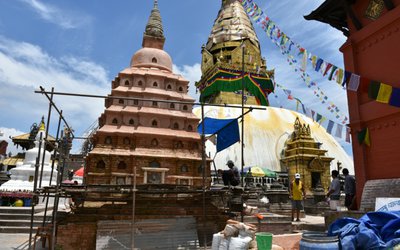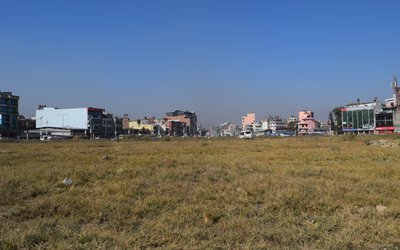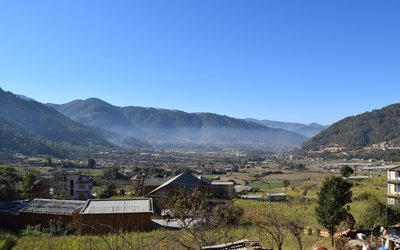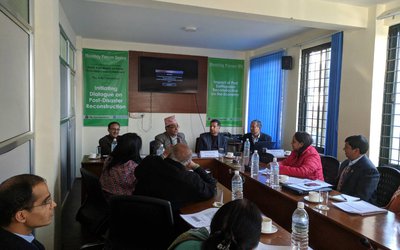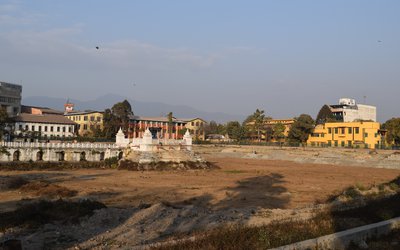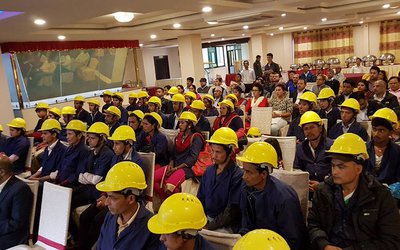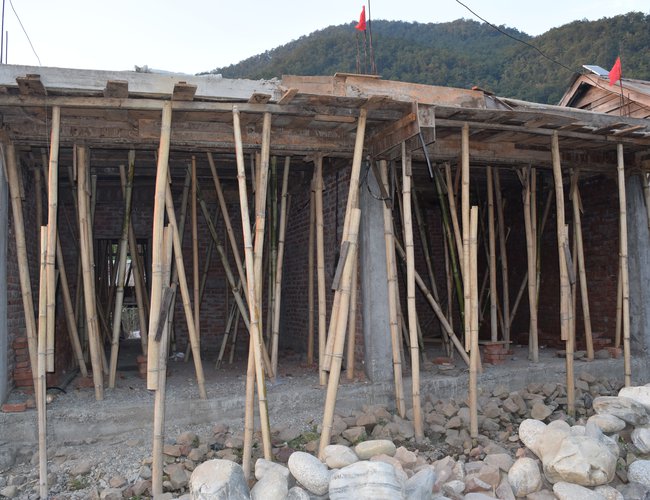
Seventy-seven years old Ait Singh Tamang, a resident of Bagmati Rural Municipality, Ward No 2, Bhorletar, is yet to receive the earthquake grant.
Although the politicians contested the local elections with a slogan to provide the affected people with grants to reconstruct their house, the agenda is given a nominal priority now. Tamang’s chairman and ward president told him to wait till the completion of the two layers of elections.
“I don’t know whether my ward chairman has pushed my application forward and paved the way to receive the grant,” said Tamang. The earthquake has badly affected Bagmati Rural Municipality, including Bhoreltar. Bordering three other districts, Lalitpur and Kavrepalanchwok in north and Sindhuli in east, Bhorletar is one of the remote villages of Makwanpur district, six hours’ drive from Hetauda.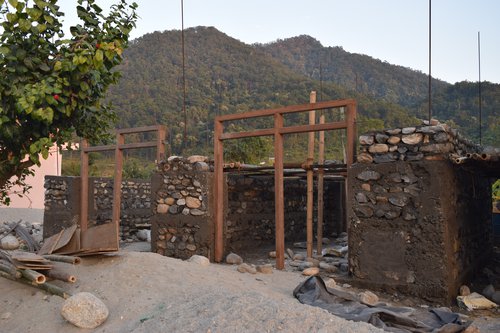
Formerly under the Faparbari Village Development Committee, Ward No 2, the Bhorletar village has seen the earthquake victims struggling now to receive the final settlement. Leaning to the wall of her under-construction house, fifty-year old Phool Maya Tamang asked whether she is eligible for the third installment. “During the election campaigns, political party leaders even assured them to increase the current grant to over Rs.500.000. Will I get the money?” asked Tamang.
These people are in confusion about getting the grant money as the locally-elected leaders are in the district headquarters to celebrate the victory of their colleagues. With the elections results of the upper tiers coming out, the representatives of rural municipalities are actively taking part in the victory marches and nobody is there to address the concerns of the earthquake victims.
Ward Chairman of Ward No 2 of Bagmati Rural Municipality, however, said that the situation of the earthquake victims has improved a lot following the elections. The Rural Municipality has already sent additional names of the victims, which were left out in the previous survey and the number of engineers and sub-overseers has increased. “Those, whose names appeared as eligible in the first list, have already received the second installment. Following the elections, the earthquake reconstruction work has accelerated,” said ward chairman.
However, the affected people disagree. “One can see the state of earthquake reconstruction,” said another victim Lok Man Tamang. “We are losing hope that the elected representatives can deliver better.”
Lack of elected local government levels was one of the most frequently cited reasons for the delay in the process of reconstruction. People like Ait Singh Tamang, however, have found nothing changing even eight months after the elections.
The story of the residents of Chisapani, Ward No 2 of HariharpurGadhi Rural Municipality of Sindhuli District is not much different. Situated in the remote western parts of Sindhuli district, bordering Kavrepalanchwok and Makwanpur, an overwhelming number of people are yet to get the second and third installments.
According to local residents, May 12, 2015 aftershock damaged almost all the houses in the village. They said that even the houses made of wood cracked.
Sixty eight years old UttardhojGhalan does not know when he will receive the second installment. “I have already completed the reconstruction of my house. Since our elected Ward Chairman has been in the election campaign for the last three months, I have been waiting to receive the second and third installments,” said Ghalan. “As I received a loan from a money lender, I have been paying a hefty interest rate per month for my loan of Rs.200.000.00. If they release the money earlier, I won’t have to pay the interest,” said Ghalan.
Published in 2017 April, the opinions expressed in the Aid and Recovery In Post Earthquake Nepal, as per a study conducted by Inter Disciplinary Analysts with support from the Asia Foundation, still ring true at least in Bagmati Rural Municipality of Makwanpur District, 70 kilometers east of Hetauda, and in Chisapani Village, Ward No 2 of HariharpurGadhi Rural Municipality of Sindhuli district.
Although earthquake victims of the villages of the two different districts are facing similar problems, elected representatives of local level have reasons to defend their negligence, too.
“Now the elections have concluded, we will spare all our time and efforts to solve the problems of the earthquake victims,” said KasangGhalan, Chairman of Ward No 2.” Once the rural municipality sends the technical staff, including the engineers, the pace of distribution of money will accelerate.”
For the villagers of Chisapani, one of the remote villages of Sindhuli District, it takes almost one and a half days to reach the district headquarters, Sindhuligadhi, and almost a five to six hours walk to reach the Rural Municipality’s Office.
“After the merger of four Village Development Committees, it takes a day for us to visit the rural municipality’s office,” said Ghalan.”This is also responsible for the delay in the process.”
In the independent impacts and recovery monitoring, phase 4, quantitative survey, April 2017; four in ten respondents had said that reconstruction would operate the same way as before and after the elections.
Fifty-five years old JanakBahadurTamangLopchan, another earthquake victim, talks about how merger of villages and successive elections delayed the grants process. Although Lopchan has already received the second installment before the elections, he is waiting to get the third installment.
With the merger of four Village Development Committees, area of Bagmati Rural Municipality has expanded largely, making it impossible for the chairman of Rural Municipality to listen to the voices of the local people.
Promulgated in October 15, 2017, Local Government Operation Act 2017 gives sweeping powers to the local level regarding many issues related to the development activities in the rural and urban areas.
According to the provisions of the act, Ward Office is responsible to issue all kinds of certification for the purpose of grants, including for the earthquake victims. Ward Office is the final authority to declare all kinds of individual status and issue certification for damage and loss. The spirit of the act is the complete devolution of power.
Even the revised provision of the Guidelines of Private Housing Grants notes the legal provision. However, the ward chairs are yet to understand what the law says about their authority.
Although there is a provision in the act that in case of his or her absence for a week, the ward chair has to hand over the authority to one of the assembly members of the ward as acting chair.
The ward chair does not see it necessary to make another acting ward chair during such absences. “Since I was travelling near my village during the elections campaign, I don’t think it is necessary to hand over the authority to somebody else,” said Ghalan.
With no sense of public accountability, no one seems compelled to appoint the person in charge in their absence. However, the prolonged period of absence of ward chairs has definitely delayed the process of reconstruction, increasing the human suffering.
The Act further specifically allows the ward chairperson to take any decision and recommendation, which cannot be challenged by any other authority. Even some of the directives of NRA are made irrelevant following the promulgation of the act.
With such sweeping powers in hand, the local level leaders can make a major change if they are determined to do so. At a time when Chief Executive Officer of National Reconstruction Authority YubarajBhusal has declared that the reconstruction of the private housing will complete by 2018, it needs the support of local level representatives to materialize this.
Given the present state of earthquake reconstruction of two villages, with no sense of public accountability among the elected representatives, it seems that the chances of alleviating the woes of the earthquake victims soon are few.
Although many houses were cracked in several places, the teams did not include the names of victims in the list as eligible for private housing grant.
After several complaints, some names were included in the name list. However, transformation of local bodies and three different elections in a matter of just eight months disrupted the process. New act in hand and three tiers of elected bodies in place, earthquake victims of these two remote villages are waiting for the days to see an accelerated pace of reconstruction in their villages.
This publication has been supported by The Asia Foundation. The contents of this publication reflect the views of the author(s), researcher(s), and contributing editor(s) and do not necessarily reflect the views of The Asia Foundation.
- MELAMCHI WATER SUPPLY: No Interruption During Monsoon
- Jun 25, 2025
- KOREAN RETURNEES: Successful Integration
- Jun 25, 2025
- UPPER TRISHULI-1: Engaging With Local
- Jun 25, 2025
- IME GROUP: Twenty Five Years Of Journey
- Jun 24, 2025
- NEPAL’S AIR POLLUTION: A Growing Health Concern
- Jun 24, 2025
